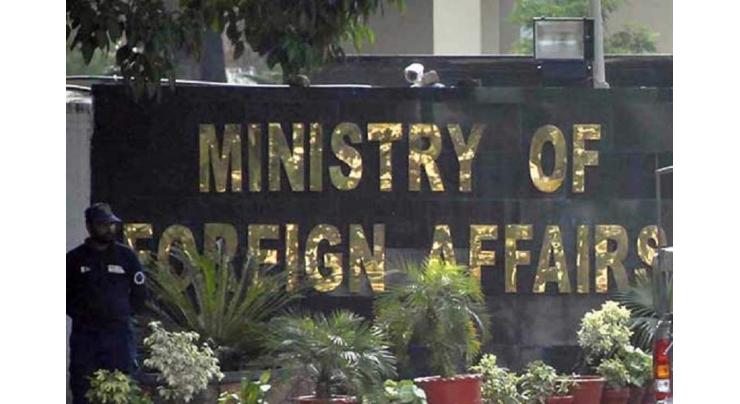
Pakistan Rejects External Profiling On Religious Freedoms
Rukhshan Mir (@rukhshanmir) Published December 12, 2018 | 03:59 PM

Pakistan on Wednesday rejected the US State Department's move to place it in the list of countries of particular concern, terming it a "unilateral and politically motivated pronouncement".
ISLAMABAD, (UrduPoint / Pakistan Point News - 12th Dec, 2018 ) :Pakistan on Wednesday rejected the US State Department's move to place it in the list of countries of particular concern, terming it a "unilateral and politically motivated pronouncement".
The Government of Pakistan has devised well establishment legal and administrative mechanisms to safeguard the rights of its citizens, the Foreign Office said and pointed "Pakistan does not need counsel by any individual country how to protect the rights of its minorities." The report on religious freedom while ignoring the systematic religious targeting of minorities in India, particularly the Muslims, places it in Tier 2 and moves Pakistan up a notch from the Watch List to Tier 1.
"Besides the clear biases reflected from these designations, there are serious questions on the credentials and impartiality of the self proclaimed jury involved in this unwarranted exercise," the Foreign Office said.
Pakistan's reaction in response to the release of the annual religious freedom report released by U.S. Commission on International Religious Freedom (USCIRF) on Tuesday highlighted the steps taken by the country over the years to protect its minorities.
Secretary of State Mike Pompeo in a statement said he had designated Pakistan among "countries of particular concern" in a congressionally mandated annual report, meaning the U.S. government was obliged to exert pressure to end freedom violations. The United States added Pakistan to the list of countries that violate religious freedom.
Pakistan pointed that "sadly, the proponents of human rights worldwide close their eyes on systematic persecution of minorities subjected to alien domination and foreign occupation such as in the occupied Jammu and Kashmir." In 2017 a Pew Research Centre analysis ranked India as among the worst in the world for religious intolerance. In the country of 1.3 billion, the incidence of hostility related to religion followed Syria, Nigeria, and Iraq; the countries known for sectarian violence.
"An honest self introspection would also have been timely to know the causes of exponential rise in Islamophobia and anti-Semitism in the US." The Foreign Office said Pakistan was a multi-religious and pluralistic society where people of diverse faiths and denominations live together.
Around four percent of its population comprises citizens belonging to Christian, Hindu, Budhists and Sikh faiths.
"Ensuring equal treatment of minorities and their enjoyment of human rights without any discrimination is the cardinal principle of the Constitution of Pakistan," the statement said.
Special seats have been reserved for minorities in the Parliament to ensure their adequate representation and voice in the legislation process. A vibrant and independent National Commission on Human Rights was functioning to address concerns on violation of the rights of minorities.
Successive Governments have made it a priority that rights of citizens belonging to minority faiths are protected as guaranteed by the law and the Constitution. The higher judiciary of the country has made several landmark decisions to protect the properties and places of worships of minorities.
As a party to 7 out of the 9 core human rights treaties, Pakistan is submitting its compliance reports on its obligations with regard to fundamental freedoms.
The U.S. Commission on International Religious Freedom (USCIRF) is an independent, bipartisan U.S. government advisory body, separate from the U.S. State Department, that monitors religious freedom abroad and makes policy recommendations to the president, secretary of state, and Congress.
In 2018, USCIRF recommended that the State Department redesignate ten countries as CPCs: Burma, China, Eritrea, Iran, North Korea, Saudi Arabia, Sudan, Tajikistan, Turkmenistan, and Uzbekistan.
"USCIRF also finds that six other countries meet the CPC standard and should be so designated: Central African Republic, Nigeria, Pakistan, Russia, Syria, and Vietnam."While at the same time the USCIRF placed 12 countries on Tier 2: Afghanistan, Azerbaijan, Bahrain, Cuba,Egypt, India, Indonesia, Iraq, Kazakhstan, Laos, Malaysia, and Turkey. These nations have been tagged for violations engaged in, or tolerated by the government during 2017 as serious and characterized by at least one of the elements of the "systematic, ongoing, and egregious" CPC standard.
Related Topics
Recent Stories

Malala expresses unwavering support for Gaza people

Selection committee dissolved over Pakistan women cricket team's poor performanc ..

Punjab CM Maryam Nawaz in police uniform at Chung police center

Currency Rate In Pakistan - Dollar, Euro, Pound, Riyal Rates On 25 April 2024

Today Gold Rate in Pakistan 25 April 2024

Mired in crisis, Boeing reports another loss

Session Awarding Ceremony 2024 held at Cadet College Muzaffarabad

Austrian ski great Hirscher to make comeback under Dutch flag

Pakistan, Japan agrees to convene 'Economic Policy Dialogue'

FM Dar conveys deepest sympathy on torrential rains devastation in UAE

Spain PM Sanchez says weighing resignation after wife's graft probe

Tennis: ATP/WTA Madrid Open results - 1st update
More Stories From Pakistan
-
PM for political commitment, adequate investment to achive goal of malaria-free world
9 minutes ago -

Malala expresses unwavering support for Gaza people
19 minutes ago -
President stresses joint efforts to control Malaria
19 minutes ago -
Karachi Police arrest four suspects in crackdown on street crime
19 minutes ago -
IRSA releases 163,300 cusecs water
19 minutes ago -
Global tributes to kashmiri icon Amanullah Khan on 8th death anniversary
29 minutes ago
-
Payment of 100 pc pension to widows of non PUGF employees of TMA demanded
49 minutes ago -
Wave of inflation not be reduced in Peshawar
49 minutes ago -
Renowned TV, stage actress, playwright, activist Madeeha Gohar remembered
59 minutes ago -
Delegation from CMCC, CMPak visit PTA
59 minutes ago -
Persian collection titled 'Gulang-e-Arzoo' on April 27
1 hour ago -
Nutrition Int'l donates high-tech food lab to IFA for enhanced quality control
1 hour ago
